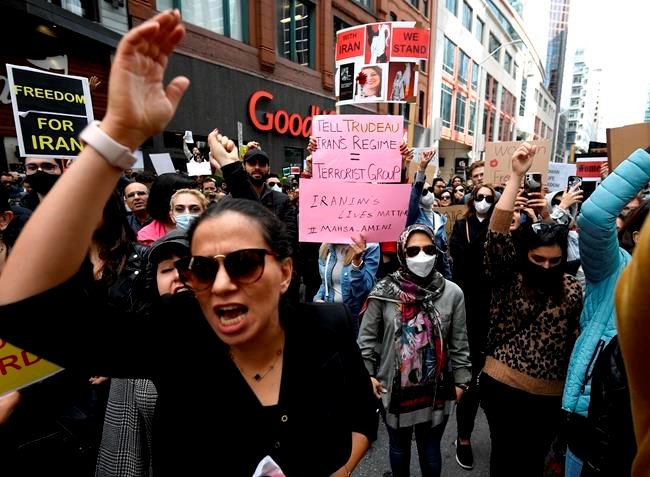OTTAWA — The Trudeau government has added 20 more Iranian officials and entities to its sanctions list, and says that within weeks Ottawa will ban entry to thousands of regime officials.
"We are not just putting out fanciful rhetoric. This is concrete; this is tangible," said Public Safety Minister Marco Mendicino.
Last Friday, Prime Minister Justin Trudeau announced Canada will forever ban more than 10,000 members of the Islamic Revolutionary Guard Corps from entering Canada, and spend $76 million to better enforce sanctions.
The Liberals provided more details Thursday on how that will work, and barred another 17 individuals and three entities from entering Canada or doing business with most Canadian firms.
Mendicino said the announcement will mean "adding up to 30 new RCMP members and civil servants" to enforce sanctions.
"We're not talking about months; I would say certainly within weeks," Mendicino said.
He also promised a way for the public to report Iranian regime officials moving within Canada.
"Setting up a hotline and operationalizing and materializing the federal funding, which has been allocated, is precisely the work that we are engaged in," he said.
Immigration Minister Sean Fraser said thousands would be barred from Canada based on intelligence that indicates whether they had been among the senior ranks of the Revolutionary Guards.
That is similar to restrictions used against regimes that committed war crimes or genocide, such as in Bosnia and Rwanda.
"People who meet the definition of being caught by virtue of their connection to the regime, will actually become inadmissible to Canada, whether their specific name is on a list or not," he said.
Fraser added that this generally applies to relatives of those people, unless they are travelling alone.
That move followed mounting pressure by the Conservatives and members of the Iranian diaspora in Canada to list the Islamic Revolutionary Guard Corps as a terrorist group.
Justice Minister David Lametti said that doing so would punish Iranians who opposed the regime, who had been conscripted into the IRGC and served in non-combat roles.
"The terrorist listing provisions of the Criminal Code are a blunt instrument. Sometimes they do not give us the precision we need to target the truly bad actors, without catching innocent people as well," he said
"I am here to tell you the path we have chosen is better."
Conservative MP Garnett Genuis said that was an excuse, given the Liberals helped pass a House of Commons motion in 2018 to list the IRGC as a terrorist group.
"They're desperately trying to put other things in the window, to distract attention from their failure to deliver on that core promise," the Alberta MP said.
"I don't think any of the excuses hold water or couldn't be resolved through rational exceptions."
In any case, Mendicino said Canada is still trying to determine how many people within the country have been part of the Revolutionary Guards, both those drafted into lower ranks and those who have held senior roles.
He also would not say whether the travel ban applies to senior leaders of the IRGC going all the way back to its founding in 1979.
"I am confident, and our government is confident, that this is the best, most effective option," he said.
"We're putting the money and the resources in place to make sure these sanctions can be implemented, so we can hold those responsible, and at the same time defend human rights here and around the world."
Meanwhile, the new sanctions unveiled by Foreign Affairs Minister Mélanie Joly apply to Iranian officials who have committed or enabled human-rights violations against women.
The list includes Mohammad Javad Zarif, Iran's recent longtime foreign minister, whom Canadian groups had asked to be sanctioned.
It also includes Saeed Mortazavi, the prosecutor who ordered the torture of Zahra Kazemi, an Iranian Canadian journalist who died in custody in 2003.
In an interview from Seoul, South Korea, Joly said it was particularly important to list Mortazavi.
"My message to the Iranian regime is we haven't forgotten, and we will never forget, and that's why we're imposing these new sanctions," Joly said.
This report by The Canadian Press was first published Oct. 13, 2022.
Dylan Robertson, The Canadian Press



